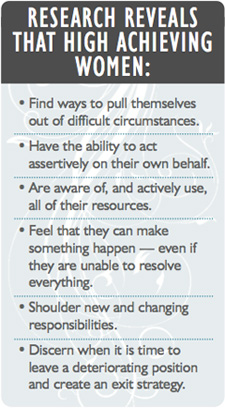
Studies indicate that connectedness plays an indispensable role in the success and fulfillment of women in ministry. People with strong networks often experience more promotions, better pay, and greater fulfillment. As leaders, women frequently attain higher levels of team performance because they are naturally gifted at building strong relationships with both genders. Successful women in church leadership who are respected by their peers — both male and female — possess a collaborative style of leadership. This empowerment model involves other people in the decision-making process. Author Carol Becker quotes a female minister in Leading Women: How Church Women Can Avoid Leadership Traps and Negotiate the Gender Maze: “I interact with people on a relational level long before I ask them to carry out assignments.” Impactful women, such as this minister, see themselves working in concentric circles of relationships; rather than a top down hierarchal model. They nurture connectivity and inspire others with their contagious spirit. This approach motivates others to embrace the commitment necessary for the ministerial task.
Networking, a vital piece of connecting, is an essential key to professional growth. People often, but mistakenly, interpret networking as being merely “political.” Networking is about connecting with people, each of who offer something unique to your field. When building a ministry, department, or organization, a leader must identify those who possess skill sets or knowledge that may be necessary as a future resource. Each connection will expand one’s thinking and allow the creation of a constellation of relationships that increase the commodity of resources. Experts stress that networking is about reciprocity and offering commodities such as information, assistance, resources, and time to build up a reserve that eventually returns a blessing.
“Engaging is when you choose to cross an invisible line from being a person to whom things ‘happen’ to becoming a person who ‘makes’ things happen. Making the commitment to do so is one of the best things a woman can do as she pursues leadership impact,” reports Barsh. Every organization needs leaders who take initiative and risks, even if some tasks are beyond their basic job description. This requires the courage and willingness to take charge of one’s calling, and to move forward in spite of resistance and apprehension. It means standing up, being counted, and owning one’s development and growth.
High achieving women in ministry say that being a “risk taker” is most critical to their survival in the male paradigm. They are not afraid. They are innovative. Essentially, women cannot lead unless they are willing to take a risk and put themselves on the line.
Self-clarity involves knowing one’s self, and how one fits into her world. It involves an accurate understanding of personal strengths and weaknesses. Dan Allender (co-founder and former President of Mars Hill Graduate School in Seattle, Washington) captures the idea of clarity regarding one’s call. “You are gifted. You are called. You are telling a story,” he states. “The clearer you can be about yourself, the further you will be on the journey of catching and being caught by your calling.” Women with self-clarity incorporate their own self-view into a realistic assessment of the culture and setting in which they serve. Self-clarity helps ministers find a role in line with their talents, values, and personal strengths. ![]()








